NHL: Ranking the number one overall picks since 2010

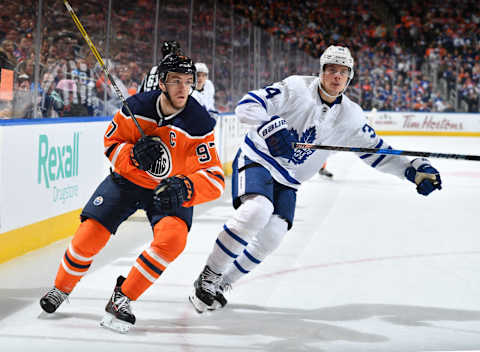
The NHL has seen superstar talent get selected early in previous drafts, from the likes of Tyler Seguin, Connor McDavid and Auston Matthews to Nail Yakupov, Jesse Puljujarvi, and Nolan Patrick. But which 1st overall draft pick, from 2010 to 2017, has been the best?
The first overall picks, in chronological order from 2010 to 2017, goes as follows: Taylor Hall, Ryan Nugent-Hopkins, Nail Yakupov, Nathan MacKinnon, Aaron Ekblad, Connor McDavid, Auston Matthews, and Nico Hischier.
It is uber-important to land a superstar in the draft, especially with the first pick. It’s quite simple; if you’re picking first, it’s likely that your team is not a very good one. Drafting a superstar could be the missing piece of the organization; just look at how Auston Matthews and Mitch Marner have turned the Leafs around, or how Nathan MacKinnon has changed the outlook on Colorado.
The draft is also the cheapest and efficient way to build a roster. If you land a superstar, then you have that kid under contract for three seasons and less than $1 million against the cap. That allows you to build a team around that young phenom for the time being.
Before I get into the meat of the article, you’re probably thinking, “What about Rasmus Dahlin and Jack Hughes?” Those two players have not played two or more full seasons, making it extremely difficult to compare them to the eight aforementioned number one picks. They could wind up being busts, for all we know. Point is, we have to wait and see what these kids can do first. Until then, let’s get into it.

8. Nail Yakupov
I believe it’s easy to see why Yakupov is the worst-ranked prospect in the span of drafts I am looking at. Yakupov is considered a bust by just about everyone, despite still being a first-round talent in hindsight, statistically. He just was not a first overall pick, not even close.
More from Puck Prose
- Detroit Red Wings 2023 Rookie Camp Has Plenty of Ups and Downs
- This Columbus Blue Jackets rookie doesn’t want to be forgotten
- 2 trades the Boston Bruins must make to secure the Stanley Cup
- 3 reasons the Avalanche won’t win the Stanley Cup in 2024
- This is a big year for Alex Turcotte and the Los Angeles Kings
Yakupov ranks 16th in games played, 8th in goals, 20th in assists and 13th in points within the 2012 class. As stated earlier, he still ranked within the top-30 picks, making him first-round talent, just not first-overall talent.
Yakupov is the only first-overall selection taken since 2010 to no longer be playing in the league today. In fact, he didn’t play a single game last year either.
He played 4 years as an Oiler, 1 with the Blues and his last year with Colorado. His career-highs were 81 (games played), 17 (goals), 19 (assists) and 33 (points). To never hit 20+ goals or assists, or 35+ points in a season after being taken 1st overall is atrocious. It doesn’t help that his slower and more aggressive grinding style does not work anymore in today’s NHL.
The Oilers didn’t help him either. He was rushed into a big role on the roster and he couldn’t sand down the rough patches of his game in the process. The Oilers put too much on his plate and put him in a position to fail. A lot of the blame goes to the organization.
By the time he left Edmonton to join St Louis, it was already too late to salvage his career. He was too far behind and only slotted into 40 games, recording 9 points. Another change of scenery to Colorado, where the team was young and looking to bounce back after an awful season, had promise for Yakupov.
He actually recorded his first positive plus/minus season with the Avalanche. But he still was extremely underwhelming, eventually losing his spot on the roster and every other NHL roster.
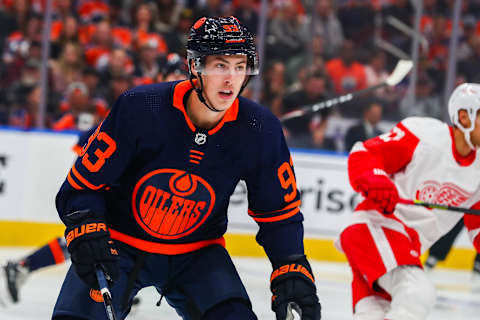
7. Ryan Nugent-Hopkins
Nugent-Hopkins is a really good player. Here’s the catch: he isn’t a great one. When you’re selected first-overall, especially by a team who has struggled for so long, you have lofty expectations set upon you. Those expectations span from the more conservative “just be elite” to the more aggressive “be the face of the franchise” approach.
Both are very difficult to achieve when A) the team around you is considered the laughing stalk of the league and you have to do most things yourself, and B) because the team sucks, you’re thrown into the fire that is facing every other teams best players in hopes that you can at least keep up.
Nugent-Hopkins ranks 3rd in games played, 5th in goals, 4th in assists and 4th in points within the 2011 draft class. Edmonton had better options when they selected Nugent-Hopkins, in hindsight.
Nugent-Hopkins is a well-liked and respected player in the league. He has never recorded 30 or more penalty minutes in a season. But that does not make you a good, bad, great or horrendous player. “Nuge,” as he is called, has recorded 20+ goals and 30+ assists just twice in his career. He’s had three 20+ goal seasons and four 30+ assist seasons. That led to him registering four 50+ point seasons, including last seasons 69 point campaign.
The Oilers have gotten off to a fast start thus far, and Nuge has recorded a goal and 5 assists for 6 points in 9 contests. If the Oilers have success, it’s clear Nuge can be an even better player than what he has been in his career thus far. But on his own, Nuge is primarily a consistent 50 point producer per season. That tally isn’t what you look for in a number one pick, unfortunately.
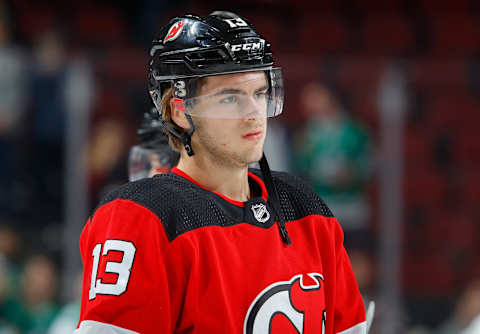
6. Nico Hischier
Hischier is not, by any means, a bad player. But for a first-overall selection, he isn’t quite there yet to compare to the other guys listed. He has the smallest sample size, playing in just over 150 games.
Lastly, Hischier ranks 1st in games played, 1st in goals, 1st in assists and 1st in points in the 2017 class. The Devils have nailed this selection thus far, but it’s important to note that it is still a small sample size, and the likes of Elias Pettersson, Cale Makar and Miro Heiskanen, who were selected in the same draft, have risen as of late, and are arguably better than Hischier.
In his first year, the Devils fired on all cylinders and wound up making the playoffs. Hischier benefitted, scoring 20 goals and assisting on 32 more for 52 points in the full 82-game schedule. He was also very smart with the puck, recording a 56 to 26 takeaway to giveaway ratio, which is comparable to the likes of Brayden Point and Mitch Marner. Hischier showed the potential of a borderline elite player, with the makeup of a potential Selke finalist.
In his second season, and the start of his third this year, the Devils were shell-shocked. Injuries and overall disappointment rattled them, and they have found themselves in the basement of the NHL. Hischier has played 75 games since the conclusion of his rookie campaign, recording 17 goals and 32 assists for 49 points.
What that tells me is this; Hischier found decent success in a slightly reduced role as a rookie on a good team, then followed it up by posting nearly identical, if not, slightly better numbers on a bad team. If the Devils can put the puzzle together, then Hischier will likely benefit.
However, he is simply just a 50 to 60 point per season player at the moment, with the upside of posting near point per game tallies with an improved roster around him. That is not bad, as stated earlier. But for a first-overall selection? Those totals are just a little underwhelming.
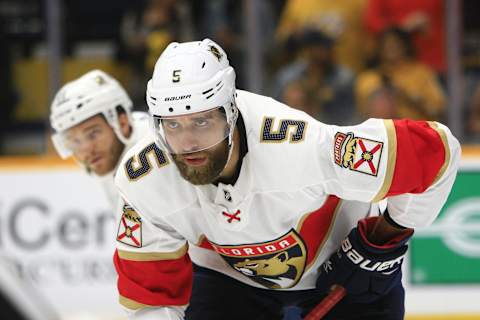
5. Aaron Ekblad
Ekblad is a minute-muncher. He’s averaged 22:30 per game in his career for the Panthers, including his 25:20 per game average this season.
Ekblad ranks 1st in games played, 8th in goals, 6th in assists and 8th in points within the 2014 draft class. Florida’s first crack at first overall in the span of years I’m looking at is a good one; Ekblad, being a defenseman, will not compare well statistically in his class, yet still ranks top-10 in the stats displayed.
He records nearly 40 points consistently every year (minus 2016-17, when he put up just 21 points). He’s also durable, playing over 75 games in all but that one 2016-17 campaign.
Ekblad won the Calder Trophy for Rookie of the Year back in 2014-15, which remains his best season, offensively. He was also in the running for the Norris Trophy in his first two seasons. However, while Ekblad came into the NHL strong and has maintained consistently throughout his career, he really hasn’t grown much. He hasn’t made any sort of improvements, outside of a few kinks in his game. It shows in the fact that his rookie season still remains as his best. As it stands, his rookie season was also his best possession season as well, recording a career-high 54.3% Corsi-for% that season.
Ekblad has always been physical and not afraid to block shots, plus he is a natural leader. His impact stretches further off-ice, which is why he ranks higher than the aforementioned players. Not to mention (again) the amount of time he plays a night, on average. His lowest time on ice average in a season was back in 2016-17 when he averaged 21:28 per game. That is pretty remarkable if you ask me. That’s why Ekblad lands at 5th and not at 7th or 6th on this list.
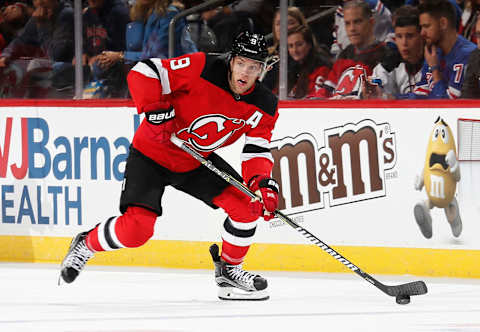
4. Taylor Hall
Taylor Hall is an incredible NHL player. He was absolutely deserving of first-overall, even in hindsight (though Tyler Seguin was selected that same year and has outproduced him). He played on a really bad Oilers team for years, was dealt after the selection of McDavid, then had a monster year before having an injury-riddled season last year.
Hall ranks 5th in games played, 4th in goals, 2nd in assists and 2nd in points within the 2010 draft class; ultimately, the Oilers could have had a better player than Hall in 2010.
He has been to the all-star game once in his career. Once. He won the Hart trophy, which is never easy, in the 2017-18 campaign, his first year with the Devils. Four times in his career did he finish a season producing at over a point per game pace. He’s had 6 seasons with over 20 goals, and only once hitting over 30 goals (39, in 2017-18). He’s eclipsed the 50 assist mark just twice in his career. He’s hit the 60+ point mark 3 separate times. He is extremely injury prone, and that has hurt his overall production.
Hall has missed 142 total games due to injury in his career. Only once did he play a full 82-game season. If you take his average ice time per game in his career, which is 19:05 (rounded down to 19:00 for the sake of even distribution), then Hall has missed 2,698 minutes of ice time from injuries.
Hall has played 10,876 minutes in his career, recording 517 points in that time. That means Hall has recorded 0.0475 points per minute. If he had played the extra 2,698 minutes that he missed from injuries, while maintaining his point per minute pace, he would have scored an additional 81 points (roughly). That’s a huge loss.
Other than his injury woes, his point production has never truly been outstanding. Hall is definitely a game-changer, no doubts about that. However, he hasn’t panned out exactly the way he was anticipated, and it led to him moving from his first team in Edmonton to New Jersey. There are reports he could move on from New Jersey as well. Everyone knows Hall has elite talent, it’s just a matter of health and consistency.

3. Auston Matthews
If there’s a more controversial person in hockey right now than Matthews, I want to meet him. The young kid from Arizona was supposed to be the next captain of the Toronto Maple Leafs. That’s when he did something so beyond stupid; he flashed a female officer while drunk during the off-season. Other than the obvious situation for him, he has also been heavily criticized as overrated by some and praised as the best player in the NHL next to McDavid by others. But there’s no denying his skill set.
Matthews ranks 3rd in games played, 1st in goals, 2nd in assists and 1st in points in the 2016 draft class. Toronto makes a great selection here with their first look at first overall in the drafts I have observed.
Matthews has recorded closer to a point per game pace in his career than Hall has, albeit in far fewer games. He’s had 3 consecutive 30+ goal seasons in his career, including a 40 goal season in his rookie campaign. He has the same amount of 40 goal years as Hall does 30 goal seasons. But just like Hall, Matthews has injury concerns. In his three full seasons, Matthews has played one full 82-game season (as many as Hall). He has missed a total of 34 games in his three-year career. His career-average ice time per game is 18:08. So, again, for the sake of even distribution, lets round his average ice time down to 18:00. In total, he has missed 612 total minutes of ice time.
Matthews has played 4,026 total minutes in his career, recording 216 points. That means that Matthews has produced at a 0.0537 per minute pace. If he had played those 612 lost minutes, while producing at the same point per minute pace, Matthews would have scored an additional 33 points (roughly). But that number is not nearly as massive a loss as Hall’s points lost from injury. That’s why Matthews takes a step ahead of Hall in this ranking.

2. Nathan MacKinnon
Nathan MacKinnon is incredible. I personally love MacKinnon’s game, as he is so much fun to watch. He works incredibly well with other Avalanche young guns like Mikko Rantanen and Gabriel Landeskog. MacKinnon is also a leader on the team, which gives him additional value.
MacKinnon ranks 3rd in games played, 2nd in goals, 1st in assists and 1st in points within the 2013 draft class; MacKinnon has shown why he was selected first by being arguably the best in his class through the years. A big selection by Colorado.
MacKinnon has played 3 full 82-game seasons in his career, more than Matthews and Hall combined. He won the Calder, as Ekblad did as a rookie. MacKinnon has been a finalist for the Hart and has been top-10 in voting for the Hart in back-to-back seasons. He has also been in Lady Byng trophy votes at one point. He is a 1-time all-star, though he will definitely gather more appearances from here on out, especially since Colorado is a consistent playoff contender.
MacKinnon has produced at a point per game pace in back-to-back seasons (97 and 99, respectively). He has been a 20+ goal scorer 4 times in his career, including two consecutive 30+ goal seasons (39 and 41, respectively). He currently sits at 12 points in 9 games played this season.
MacKinnon has certainly panned out for the Avalanche since selecting him with the number one pick back in 2013. He is considered by many to be the second-best player in the league, behind Connor McDavid, and competing against the aforementioned Matthews, Nikita Kucherov, Patrick Kane and Sidney Crosby.
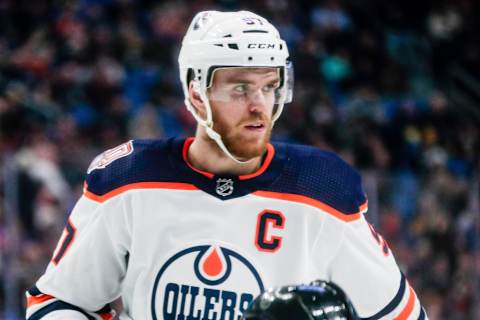
1. Connor McDavid
Are you really surprised? I mean, honestly. McDavid is going to be not just the face of the Oilers, but the face of the NHL for many years to come, especially once the likes of Crosby and Kane move on.
McDavid ranks 2nd in games played, 1st in goals, 1st in assists and 1st in points in his draft class; Edmonton finally struck gold with their fourth first overall selection I’ve looked at, but it was expected that McDavid would take the league by storm. He has nearly 400 points in less than 300 games played. Unreal.
McDavid has missed just 4 games due to injuries since his rookie year. He has had 3 consecutive 100+ point seasons, which is absolutely insane in today’s NHL, what with the evolution of goalies. McDavid has recorded back-to-back 41 goal seasons as well, and 3 consecutive 30+ goal seasons. He has never finished a season below a point per game pace, including his 48 points in 45 games in his rookie year. He is a 3-time all-star, 1-time Hart trophy winner, 2-time Pearson trophy winner, and 2-time Art Ross trophy winner. McDavid is absolutely insane.
Next. Every Team's Greatest Player Of All-Time. dark
McDavid only averaged under 20 minutes (as a forward!!!) in his rookie season. He only missed out on the Calder trophy because of his collarbone injury. McDavid is one of the fastest skaters of all-time, and he has incredible hands to embarrass defensemen and goalies alike. He is next-level talent, and no one can touch him. McDavid is easily the best first-overall selection since 2010 and for many years to come.